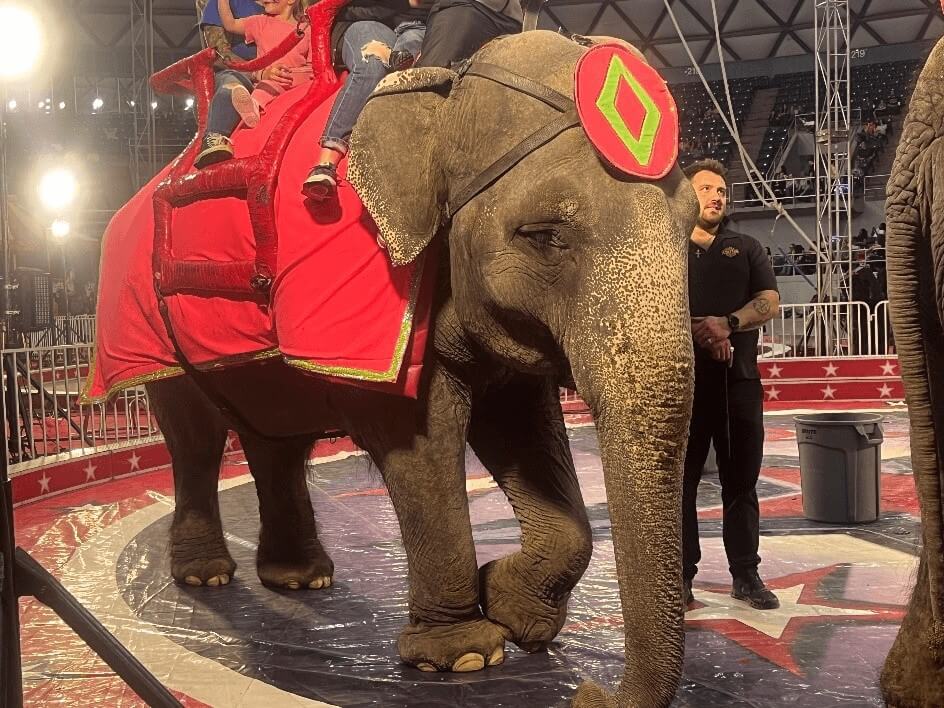For decades, elephants have been exploited under the bright lights of circuses — paraded, forced to perform, and denied the natural lives they were born to live. Among the many heartbreaking cases, one elephant’s story has risen to international attention: Betty, who has been called the most depressed elephant in the world.
Today, Betty’s health and well-being are deteriorating rapidly. Observers and animal welfare advocates report that she is at risk of collapsing from chronic pain and failing health. Yet instead of being allowed to retire to a sanctuary where she could live out her final years in peace, Betty remains under the control of the Carden Circus, which continues to exploit her in traveling shows.
A Life of Exploitation
Betty’s story is not unique within the circus industry, but it is one of the most severe examples of long-term suffering. For decades, she has been forced to perform unnatural tricks in front of cheering crowds while enduring harsh training methods and constant travel.
Behind the scenes, elephants like Betty are deprived of the basic freedoms they would enjoy in the wild: roaming over vast distances, forming complex family bonds, and foraging in diverse landscapes. Instead, she has been confined, controlled, and denied the very essence of what makes elephants such extraordinary beings.
This relentless cycle has taken a devastating toll on her body and spirit. Betty now shows visible signs of pain and depression — her movements are labored, her demeanor subdued, her spirit broken.
The Urgent Need for Intervention
Animal welfare groups, including PETA, have urged the USDA to intervene and hold the Carden Circus accountable for Betty’s condition. Advocates argue that her ongoing exploitation is not only cruel but potentially unlawful under animal welfare standards designed to protect against extreme neglect and suffering.
Circus life is particularly brutal for elephants, who are highly intelligent and social animals. Years of constant transport, chaining, and forced labor can cause a cascade of health issues: severe arthritis, foot infections, joint damage, and emotional trauma. For Betty, the toll has been so profound that her collapse may be imminent if urgent action isn’t taken.
Why Betty’s Story Matters
Betty represents more than one elephant’s struggle. She symbolizes the broader, systemic cruelty still faced by captive elephants in circuses across the globe. While public opinion has increasingly turned against animal-based entertainment, and many circuses have retired elephants altogether, others continue to resist change.
By highlighting Betty’s suffering, advocates hope to not only free her but also push for the permanent retirement of elephants from circuses altogether. A life in a sanctuary — where elephants roam in wide spaces, form bonds, and heal — is the least that animals like Betty deserve after decades of exploitation.
How You Can Help
The fight for Betty is far from over, and every voice matters. Supporters are being asked to demand that the Carden Circus retire Betty immediately so she can spend her remaining years in a safe, natural environment.
Additionally, learn more about the plight of elephants and the ongoing campaigns to protect them through the Sustainable Action Now Elephants category.
By raising awareness, supporting advocacy groups, and refusing to attend circuses that exploit animals, we can collectively help bring an end to this outdated and cruel industry.
Final Thought
Betty’s story is heartbreaking, but it is also a call to action. No animal should be condemned to a life of suffering for human entertainment. With her health failing and her spirit already broken, Betty deserves freedom, dignity, and peace before it’s too late.
Together, we can ensure that her legacy becomes more than one of pain — but instead a turning point in the global fight for elephant rights.


